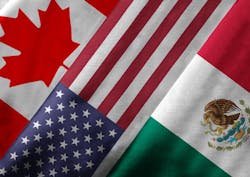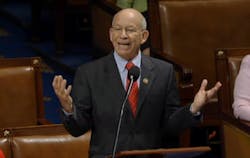House Dem's NAFTA redo would drop cross-border trucking provision
If President Trump wants to rework the North American Free Trade Agreement, a group of House Democrats is ready and willing to provide the blueprint. Led by Rep. Peter DeFazio (D.-OR), the ranking member of the House Transportation and Infrastructure Committee, the resolution introduced Thursday includes a provision that would remove the cross-border trucking requirement—a long-problematic clause in the current trade deal.
“For the first time in nearly a quarter-century, we have an opportunity to replace NAFTA and build a fair trade policy that works for all Americans,” said DeFazio. “After working with labor stakeholders and fair trade advocates, we have come up with principles that will serve as the foundation of a sustainable trade policy that will bring jobs back to the U.S. while protecting America’s environment, workers, consumers, and sovereignty.”
The resolution has been endorsed by the AFL-CIO, Teamsters, United Steelworkers (USW), International Association of Machinists and Aerospace Workers (IAMAW), Communications Workers of America (CWA), Public Citizen, and Citizens Trade Campaign.
Both the Teamsters and Public Citizen were vocal opponents of implementing the cross-border trucking provision with Mexico, seeking in Congress and the courts to block the requirement included in the 1994 treaty. Indeed, it took 20+ years, several partial programs and some $2 billion in annual retaliatory tariffs by Mexico before the trucking program was fully implemented in in January 2015—yet the lawsuits kept coming.
Under DeFazio’s replacement plan, specifically, such an agreement “should not require access to United States roads for commercial vehicles domiciled in other countries” and should require all such vehicles and drivers entering the country to meet all U.S. highway safety and environmental standards before being granted access.
The Owner-Operator Independent Drivers Assn., which has fought the program with Mexico, supports the new plan, “particularly with regard to the provision about commercial trucking,” says Executive Vice President Todd Spencer. “Trucking companies from Mexico have had little interest in operating throughout the U.S. and absolutely no ability to comply with our rigorous safety regulations.”
Indeed, due to congestion at U.S./Mexico points of entry, carrier management on both sides have been slow to embrace long-haul capability, and only 25 Mexico-based carriers have received long-haul authority.
But, according to FY 2016 inspection data, these fleets are meeting U.S. safety standards: Both the driver out-of-service rate (0.53%) and the vehicle rate (15.89%) were lower than the U.S. averages (4.9% for drivers, 20.05% for vehicles).
The U.S. DOT has not responded to a request for comment, but the American Trucking Assns. points to the 168% increase in the value of goods traded between the U.S. and Canada (and the “thousands of jobs in the trucking industry”) as a result of a more functional cross-border trucking program. Likewise, trucks move 83% of the trade between the U.S. and Mexico.
“Our support for the DOT’s cross-border trucking program is unchanged. Trade and trucking are synonymous, and the increased movement of freight yields more good paying jobs and growth in American companies,” said ATA Vice President of Public Affairs Sean McNally. “We want to help the Administration and Congress build a trade framework that helps grow our economy, including the trucking industry. We will work to support any trade policies that help grow good paying American jobs and the trucking industry.”
Other principles laid out in Rep. DeFazio’s resolution, called the Blueprint for America’s Future Trade Policy, direct that any NAFTA replacement deal negotiated by President Trump must:
- Require Strong Labor & Environmental Standards—and Ensure They are Enforced
- Add Strict, Enforceable Disciplines to Fight Against Currency Manipulation
- Eliminate Procurement Provisions that Undermine Buy America
- Require Imports and Foreign Companies Operating in the U.S. to Adhere to U.S. Laws
- Lower the Cost of Prescription Drugs
- End Tribunals that Undermine U.S. Trade Enforcement Laws, Such as NAFTA’s Chapter 19
- Require Strong Rules of Origin on Cars, Auto Parts, and Other Manufactured Goods
- Eliminate the Dangerous ISDS Provision that Undermines U.S. Sovereignty
- Protect U.S. Energy Policy
The resolution directs President Trump to initiate the renegotiation of NAFTA no later than June 1. All of the provisions included in the resolution must be agreed to by Mexico, Canada, and the U.S. before the agreement can be approved.
If negotiations are not completed and all the provisions outlined in the resolution agreed to within one year of beginning talks, the resolution directs the President to consider withdrawing the U.S. from NAFTA.
About the Author
Kevin Jones 1
Editor
Kevin has served as editor-in-chief of Trailer/Body Builders magazine since 2017—just the third editor in the magazine’s 60 years. He is also editorial director for Endeavor Business Media’s Commercial Vehicle group, which includes FleetOwner, Bulk Transporter, Refrigerated Transporter, American Trucker, and Fleet Maintenance magazines and websites.

